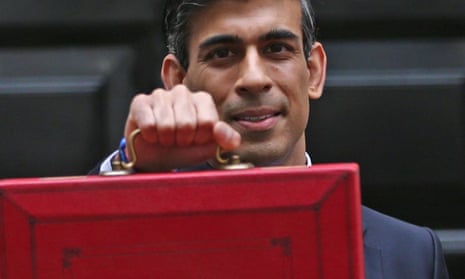Miatta Fahnbulleh: ‘The chancellor has picked ideology over people’

The chancellor came into the chamber with great optimism, but he needed to do three things to ensure this was based on more than just hot air: shore up the recovery with a big investment package, act on the climate crisis and protect struggling families. So did he do enough?
Larger than expected spending on public services was good news and has locked in a consensus that we can’t return to the austerity of the past decade. But welcome investments in public services were overshadowed by a budget that barely mentioned the climate crisis just days before Cop26. The chancellor said he wanted to build a new economy coming out of this crisis and today he had that chance – he could have boosted it like Joe Biden in the US with a £70bn a year stimulus to create 800,000 jobs and smooth our transition to net zero. But instead he opted to slash fuel passenger duty on domestic flights and ducked the chance to bolster an economy that the Office for Budget Responsibility projects will be 2% below its pre-pandemic path in 2024.
And while the increase in the national living wage to £9.50 an hour and the long-overdue reforms of the universal credit taper rate are welcome and will provide some relief for struggling families, the 3 million people hit by rising prices and the £20 cut to universal credit were left abandoned.
The chancellor spoke of responsibility but in his rush to balance the books by the end of the parliament he picked ideology over people. This will prove to be a grave mistake in weeks and months to come. At 6% of tax receipts, debt payments are the second lowest since the second world war and with the Bank of England stepping in to buy up 99.5% of the debt issues by the government since the start of the pandemic, Sunak had the leeway and the space to shore up the economy. And when the IMF is projecting that our recovery will lag behind all other G7 countries by 2024, this was the time for him to do precisely that.
If the chancellor were serious about recovery and responsibility, this would have been a budget that prioritised people and looked after the planet for generations to come.
Miatta Fahnbulleh is chief executive of the New Economics Foundation
Katy Balls: ‘It only works if people feel better off, and that’s far from guaranteed’

Rishi Sunak has offered the clearest hint yet of how the Tories plan to fight the next election. After getting the tricky part of tax rises done well before today’s event, Sunak was able to focus on the good news – announcing across-the-board real-term funding rises for each government department.
As the chancellor announced a series of spending pledges, he tried to separate Boris Johnson’s government from the austerity seen under David Cameron and George Osborne. On education, he made a point of saying pupil funding would return to 2010 levels.
Sunak seemed perfectly happy moving on to Labour’s turf. Even unfazed when his announcement of new family hubs – as part of a focus on early years – was met with cries of “Sure Start” from the Labour benches, who remain angry that cuts to council budgets under the 2010 coalition government led to the closure of many Sure Start centres that dealt with just this.
But if the new Tory position is to try to steal Labour’s clothes on spending, there were also hints of areas that they want to neutralise by the time of the next election. After coming under fire from his own MPs over the cut to international aid from 0.7% to 0.5% of national income, Sunak said that, if the recovery went as expected, this would be restored by the end of this parliament, in 2024-25.
While Sunak was in effect announcing that the cut will last longer than he first suggested, it reflects how Tories want to take the heat out of the issue before going to the polls. MPs in Liberal Democrat/Tory marginals have suggested it could hurt them on the doorstep.
Sunak also offered hope to those Tories who are still pining for a return to low taxes by insisting it was his aim to cut tax by the end of this parliament, and announcing a move there and then in the form of the universal credit taper rate.
The Tory strategy of running on funding public services and prioritising workers will ultimately succeed only if people feel they are better off than before. With the cost of living crisis beginning to bite, that is far from guaranteed.
Katy Balls is the Spectator’s deputy political editor
Polly Toynbee: ‘Optimism is free but the price of everything else is rising’

An “age of optimism”? That’s gas and air disguising another age of austerity, small sums released in deceptive balloons. A “new economy”? It looks painfully familiar, with the books balanced by growth-destroying belt-tightening.
Never mind Cop26, this was anti-green, encouraging more use of cars and domestic flights, not trains. It won’t “level up” as the cost-of-living crisis hits pockets hard through this winter. The universal credit taper alleviates that £20 a week cut for just a third of those who lost out – and only the “hard workers”.
It strikes an odd contrast with the national insurance increase for all workers, while unearned profits from landlords’ rents, share dividends and private equity are subject to a fraction in tax. Banks get tax relief, while the grossly undertaxed Amazon and online retailers escape again.
Slim pickings for most departments, especially education, with only the NHS a real gainer. But even here, even with extra capital for technology and buildings, the health service will still struggle badly, understaffed and threadbare after so many years of the worst ever underfunding, and amid a soaring rise in the number of elderly people.
As public services suffer, expect blame to fall on public workers: there’ll be no more clapping but instead a hail of assaults on NHS “inefficiency” with threats of yet more “reform”; Tory MPs are already calling the NHS an unsustainable black hole, itching for an insurance-based system.
Money for local government is meagre compared with the already £15bn cut since 2010. The punishing effect this will continue to have on social care will block more NHS beds, as care homes close. Then consider the plight of the even less visible services, such as those covering squalid prisons, delayed courts or excluded children. Remember those as the chancellor salts away quite a war chest for pre-election tax cuts, with speculation mounting for an election sooner rather than later. Little in this budget does what it claims: optimism is free but the price of everything else is rising.
Polly Toynbee is a Guardian columnist
Carys Roberts: ‘Sunak’s position on green issues charged in the wrong direction’

Despite Rishi Sunak’s talk of a new, different economy, his speech failed to set out the plan or investment needed to tackle the government’s major challenges: an escalating cost of living crisis, a public sector drained by a decade of cuts and a pandemic, and the need to put the UK on track for a strong, green recovery.
The universal credit taper rate and rise in the national living wage are both good and necessary policies. But they do not make up for the £20 a week cut to universal credit. About 5.5 million people have lost income as a result of this cut to the basic social security rate, the largest of its kind since the second world war.
Sunak pledged real-terms funding increases for all public sector departments. But even the cheeriest news, such as the £2bn promised to education spending, only returns per-pupil funding to 2010 levels. That is hardly an ambitious pledge when our education sector, alongside other services such as health and care, is struggling to catch up from the pandemic.
At the Cop summit in Glasgow next week, the UK will be judged for its leadership on decarbonising the economy and restoring nature. Yet Sunak’s position on green issues charged in the wrong direction. Cutting taxes on domestic flights will lock the UK deeper into its fossil-fuel dependency and is an appalling signal to send out just a few days from the climate conference.
To restore public finances and put the UK on course for a green, long-term recovery, the chancellor needed to invest far more. There is still a lot of uncertainty about the medium-term prospects for Britain’s economy. Medium-term growth could well be 3% or 5% behind its pre-pandemic trajectory. The economically sensible choice would have been to announce a major stimulus package of £70-£90bn, focused on green industries, fixing the care crisis and redressing a decade of underinvestment in public services.
The chancellor will be hoping that the holes in his plan will be masked by spin. But he should not be believed.
Carys Roberts is executive director of the Institute for Public Policy Research
Frances O’Grady: ‘The pay squeeze continues and it will hurt us all’

Ignore the government’s grand claims, this will be another time of hardship. Even if the chancellor says he has ended the pay freeze, the UK is still deep in a pay squeeze.
Real wages are only just getting back to their 2009 peak. But flatlining pay is on the horizon – again. Hidden in the small print, the chancellor admitted that real terms pay will barely move in the next four years – with a minuscule average forecast of 0.3% growth a year to 2025.
Working families needed a plan to boost pay across the whole economy. But what they got – after 11 years of Conservative government – was a triple whammy of tax hikes, fast-rising energy and food bills, and a universal credit cut that was tweaked, not reversed.
All the while, wages across the economy are at standstill.
That hits everyone. And it dampens our recovery. Because when working people spend their wages in their local high street, it goes into other people’s pay packets. From nurses and teachers to supermarket workers and bar staff – across the economy we’re all part of the same pay circle.
We needed the chancellor to announce fair pay deals for whole industries, negotiated with unions, to get pay and productivity rising in every sector. Around the world, countries from New Zealand to the US are recognising that collective bargaining is key to drive up pay. It’s time our government did too.
As the UK prepares to host the world at Cop26, the chancellor failed to invest enough in good green jobs on decent wages as part of a just transition to a low-carbon economy.
After 11 years of austerity, the new funding announced for public services does not make up what has been lost. Many of the services we all rely on remain close to breaking point.
This is not a “new economy” – it’s back to the old errors of a decade ago. The pay squeeze continues and it will hurt us all.
Frances O’Grady is general secretary of the TUC
